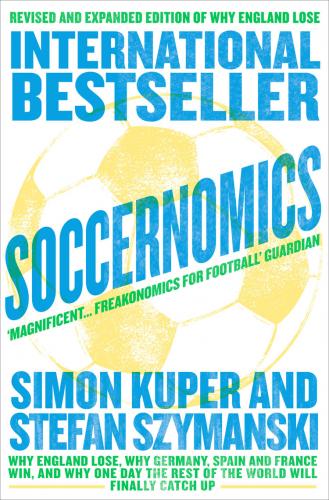Maybe, but Stefan argues that fixing-for-gambling is not a simple, costless or risk-free business. First, you have to work with accomplices (the players or referees) who have by definition shown themselves to be untrustworthy. Second, the fixers have no legal comeback if the fix fails. This often happens – the best-laid plans, etc. What if you just can’t find a way to let in that crucial fourth goal? It’s almost impossible to fix all twenty-two players and the referee, so you may find some eager young thing scoring an inconvenient goal.
Third, the return on a successful fix might be small. The easier the fix, the more likely the game’s outcome was anyway, and so the worse the betting odds. You can bet on whether the sun will shine in California tomorrow, but if you win you won’t make much money. Fourth, if you fix the outcome to be something that no one expects then the players or referee making the fix happen will charge a high price for the risk (reducing your profit), and the chances that the fix will be detected are greater. That means that you might get nothing. Legal bookmakers do not pay on fixes, and we doubt that collecting is easy in illegal markets when the bookies suspect they have been conned.
Fifth, though the internet has made fixing easier, it also makes it easier for the good guys to uncover fixing. Legal bookmakers have big incentives to find and stop fixes. Their business relies on punters believing that the outcomes of sports events are uncertain. Moreover, in many fixes the legal bookmakers are the victims. So legal bookies – helped by gambling radar services – are always on the lookout for suspicious betting patterns. There are also amateur sleuths looking for illegal patterns in the data of online gambling sites such as Betfair. In 2017 three academics – Christian Deutscher, Eugen Dimant and Brad Humphreys – caused uproar in the German parliament when they published a working paper claiming to have statistical evidence that there were irregular betting patterns associated with two Bundesliga referees officiating between 2011 and 2015.
Here’s a story which nicely illustrates Stefan’s and Simon’s contrasting positions on the problem. In spring 2011, somebody whose name and job we are not allowed to mention (because he is terrified of match fixers) showed Simon a legal gambling website offering odds on the next weekend’s Serie A matches in Italy. ‘What strikes you about those odds?’ he asked.
‘That everyone already knows two results already,’ said Simon. For Chievo–Sampdoria, so much money had been bet on a tie that you earned almost nothing for correctly predicting that result. And for Brescia–Bologna, almost the whole market had bet on a home win. That weekend, lo and behold, Brescia beat Bologna and Chievo–Sampdoria ended in 0–0. ‘Exactly as predicted’, reported the newspaper Corriere della Sera. ‘Zero–zero, zero real chances, zero desire to harm the opponent, zero anything’.
Had the fix worked? From the fixers’ perspective, probably not. Rather, technology worked. Legal bookies had discovered the fix from betting patterns, and the fixers probably won’t have made money out of it. If this is what usually happens, then fixers will go out of business. On the other hand, it still appeared that a fix had taken place. Spotting odd betting patterns is not enough to prove a fix in a court of law and so if there was a fix, the fixers escaped unpunished.
Neither fixing-to-win nor fixing-to-gamble is easy to stop. The media find any kind of organized crime difficult to cover. Tracking down match fixing is time-consuming, and few media organizations nowadays can afford to finance long investigations. Given fixers’ connections to the underworld, an eager journalist can get hurt. It’s also hard to find proof, and even if you do, libel laws in some countries would stop you publishing it.
The authorities likewise struggle to do much. Hard evidence of fixing usually requires intricate international cooperation. Europol, the European police agency, explained in 2013: ‘One fixed match can involve up to 50 suspects in 10 countries, spanning different legal frameworks and definitions of match-fixing and betting fraud.’ Given the complexities involved, the police have other priorities. A Western European policeman – one of the very few working on match fixing in his country – told us he had neither the budget nor the contacts to travel to China to investigate a case.
Sport’s governing bodies do little better. Most major associations (FIFA, UEFA, the FA, the German DFB) have their own match-fixing units, but like the police and media, they rarely find evidence that would stand up in court. Sylvia Schenk of the anti-corruption NGO Transparency International says that governing bodies worry more about scandals than problems, and because match fixing is rarely revealed, it rarely produces scandals. Anyway, as we’ve seen, sporting authorities are themselves often corrupt too.
Nonetheless, there are ways to fight match fixing if the will to do so is there. The internet has spawned more gambling, but it has also created more data to reveal fixes. Some federations have set up anonymous hotlines for whistle-blowers to report match fixing. There is also some official ‘match-fixing education’, which teaches athletes to avoid any contact with gamblers or illegal bookmakers, because even friendly conversations can lead to crime. One practical step is to assign referees to games at the last minute, so that it is harder for fixers to get to them. All these things are being done. However, it’s almost impossible to say how effective they are.
Конец ознакомительного фрагмента.
Текст предоставлен ООО «ЛитРес».
Прочитайте эту книгу целиком, купив полную легальную версию на ЛитРес.
Безопасно оплатить книгу можно банковской картой Visa, MasterCard, Maestro, со счета мобильного телефона, с платежного терминала, в салоне МТС или Связной, через PayPal, WebMoney, Яндекс.Деньги, QIWI Кошелек, бонусными картами или другим удобным Вам способом.
